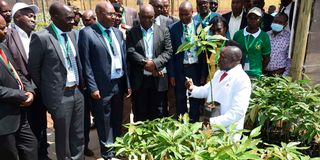Boost agriculture to end hunger, poverty

Livestock PS Harry Kimutai third (left), Uasin Gishu Deputy Governor John Barorot (second left) and other guests listen to Andrew Tubei-General Manager of Sololo Agriculture Limited as he explained about avocado seedlings, during the First Kenya National Avocado Conference held at Parachichi Centre in Uasin Gishu County on November 23, 2022.
Kenya’s underinvestment in agriculture has curtailed efforts to achieve food security and eradicate poverty. According to the Food and Agriculture Organization (FAO), agriculture is key to Kenya’s economy as it contributes 33 per cent of the gross domestic product and 27 per cent of GDP indirectly to other sectors which have jointly employed many people in the country.
The poverty and food insecurity rates have hugely increased due to climate change and underinvestment in agriculture. FAO says 46 per cent of the population lives on less than $1 a day and 35 per cent of children are malnourished for lack of enough and nutritious food.
Our population is rapidly growing and the scale of agricultural production cannot cope with it due to underfunding and a lack of modern farming skills.
President William Ruto, during his campaigns, promised to empower agriculture if he clinched the presidency. This is the best time for Dr Ruto to deal with it. We will never achieve food security and end poverty unless we invest greatly in agriculture.
Subsidised fertiliser
Subsidising fertiliser is one way of boosting agriculture but it is not enough. Farmers need a lot to achieve a standard level of production. They need capital and proper and affordable animal and crop breeds, as well as agricultural extension services to guide them on how to use various farm implements for maximum production.
It is shocking that the country depends on imports of food that we can produce in surplus; that shows our reluctance in pursuing food security. Many people with large productive pieces of land are still unable to bring food to the table due to poor farming skills. This is what mainly hampers our food security goal.
The government should enhance its funding for agriculture to ensure that both large- and small-scale farmers access funds and loans easily to help them in purchasing the necessary inputs.
Also, invest in irrigation. Most farming activities are rain-dependent and that leaves a lot of productive land in arid and semi-arid areas unproductive during the dry season. Were the land put under irrigation, we could increase our production and reduce the food shortage.
The government should also deploy enough extension officers to be always available at the grassroots to help farmers with decision-making and equip them with modern farming techniques to increase our agricultural production scale.
Especially in rural areas, where food insecurity and poverty are prevalent, agriculture is vital in achieving food security and poverty alleviation. Indeed, strengthening the agricultural sector and empowering the poorest and most vulnerable is a prerequisite for achieving recovery and growth following the recent years of drought and slow development.
Samwel Obegi, Migori




